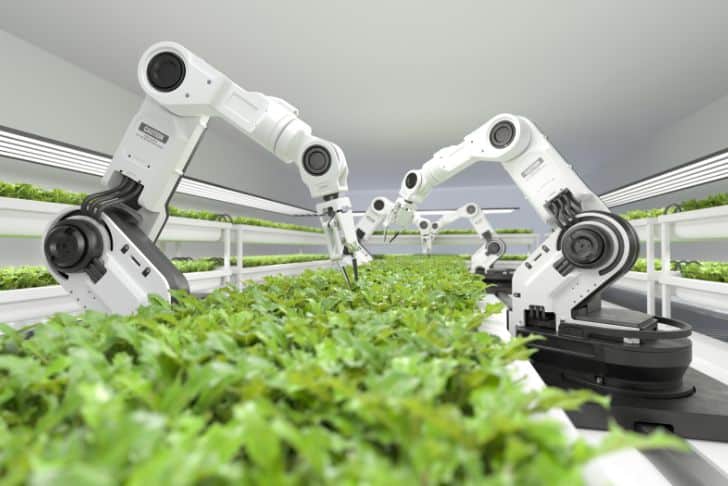Your reading journey begins with an enlightening exploration into the transformative realm of artificial intelligence (AI). This intriguing article broadens your understanding of AI’s vast applications, spanning across 15 diverse sectors, from healthcare’s early disease detection and personalized medicine to retail’s inventory management and customer service support. Delving into the variety of innovative applications of AI is harnessed, for instance — the manufacturing industry optimizes supply chains and predicts maintenance needs while the transport industry enjoys intelligent traffic management and self-driving vehicle technology.
Furthermore, AI’s implications in agriculture, finances, education, the energy sector, HR, legal services and more offer rich insights. Offering you a panorama of AI’s real world implementations, this article underlines AI’s pivotal role in revolutionizing how you interact with various facets of life in our 21st-century society and its prominent influence on shaping the future.
Artificial Intelligence in the Field of Agriculture
Artificial Intelligence (AI) plays an increasingly pivotal role in modern-day agriculture. Constant developments in AI have made it possible to instill a higher level of precision and efficiency in various agricultural practices.
Use of AI for Crop Monitoring
You can improve your crop yield and minimize losses by employing AI for crop monitoring. AI-supported systems help you to identify potential issues much earlier by analyzing crop health data. Patterns in the data suggest pest activity, soil deficiency, or diseases, enabling you to take corrective actions promptly.
Yield Prediction through AI
AI helps you predict your agricultural yield with remarkable accuracy. AI algorithms use weather data, historical crop performance, and real-time field data to predict the quality and quantity of the future yield. This foresight can aid you in planning your harvest strategies, manage supply chains, and set market prices.
The Concept of Precision Farming
Precision farming is an outstanding application of AI in agriculture. It involves using AI technologies to monitor and optimize crop needs, ensuring that your crops get exactly what they need for optimum health and output. This reduces wastage of resources and improves crop health, leading to a higher yield.
Autonomous Tractors in Agriculture
AI technology now lets you employ autonomous tractors in your fields. These tractors use GPS and AI to steer themselves, allowing for precision farming. This reduces operational costs and can boost your productivity tremendously.
Implication of AI in the Retail Industry
The role of AI is increasingly significant in the retail industry. AI helps you optimize inventory levels, offer targeted marketing, enhance customer experience, and employ advanced visual search technologies.
AI for Inventory Management
Artificial intelligence improves your inventory management by forecasting product demand, allowing you to maintain optimal stock levels. The AI algorithms use historical sales data, patterns, and trends to predict future demand, helping you prevent shortages or overstocking.
AI-Driven Targeted Marketing
AI allows you to offer personalized marketing to your customers. AI can analyze individual customer purchasing patterns and behavior to predict future purchases. This lets you tailor your marketing to individual preferences, improving efficiency and customer satisfaction.
Customer Service Support with AI
AI chatbots are now widely used for customer service. These chatbots can provide instant responses to customer queries, handle basic tasks, and direct more complex issues to human operators. This reduces your customer wait time and enhances their experience.
Visual Search Technologies in Retail
Artificial intelligence-enabled visual search technologies have made the shopping experience more interactive. Customers can now upload images and find similar products in your store. This technology enhances customer engagement and can boost your sales.

AI Applications Transforming the Healthcare Sector
Artificial intelligence has been at the forefront of transforming healthcare. From early disease detection to patient data monitoring, AI in healthcare is making treatment more effective and efficient.
AI for Early Disease Detection
AI algorithms can analyze medical images to detect diseases in their early stages. By recognizing patterns associated with diseases, AI enables earlier intervention which improves treatment outcomes.
Personalized Medicine via AI
AI enables you to offer more personalized treatments to your patients. It can analyze genetic information, lifestyle, and personal history to predict an individual’s risk of diseases. Based on these insights, you can tailor treatments to individual needs.
Drug Discovery with AI
AI accelerates the process of drug discovery. AI algorithms can analyze a vast number of molecular structures to predict their potential therapeutic effects. This speeds up the development of effective and safe drugs.
AI in Mental Healthcare Support
Artificial intelligence can also support mental health care. AI applications offer cognitive behavioral therapy, which can be a valuable supplement to traditional therapy. They provide patients with access to mental health support at any time, increasing the likelihood of a positive outcome.
Patient Data Monitoring through IoT Devices
Internet of Things (IoT) devices use AI to monitor patient data in real-time. This enables constant monitoring of a patient’s health status, which can be crucial in chronic disease management as well as post-operative care.
Revolutionizing Customer Service with AI
AI is revolutionizing customer service by providing instant assistance, analyzing customer sentiment, personalizing customer experiences, and providing product recommendations.
Virtual Assistants for Customer Queries
AI-powered virtual assistants can handle multiple customer queries simultaneously. They can provide immediate, automated responses to common queries and get customer service representatives involved when required.
Sentiment Analysis through AI
AI can analyze customer feedback and reviews to provide insights into customer sentiment. This helps you understand customer preferences, dislikes, and areas of improvement.
AI-Powered Personalized Customer Experiences
AI provides personalized shopping experiences by suggesting products based on the customer’s browsing history and purchase patterns. This can contribute positively to customer satisfaction and loyalty.
Product Recommendations using AI
AI’s ability to analyze previous purchases and customer behavior patterns lets you provide personalized product recommendations. Customers are more likely to make a purchase when they receive recommendations tailored to their preferences.

The Role of AI in Finance
AI in finance leads to more secure, swift, and personalized services. From fraud detection to wealth management, AI is playing a critical role in financial affairs.
AI for Fraud Detection
AI and machine learning models can analyze millions of transactions in real-time and detect any fraudulent activities. They can identify patterns and anomalies that suggest fraud, offering an effective means to prevent financial loss.
Algorithmic Trading through AI
AI enables faster and more accurate trading. It can analyze massive amounts of financial data and initiate trading decisions based on pre-set rules. This ensures consistency, minimizes the impact of human emotions on trading decisions, and can potentially lead to higher profits.
Risk Assessment with AI
AI can significantly enhance the accuracy of risk assessment in finance. It can analyze a multitude of data points to provide comprehensive risk profiles, helping analysts make informed decisions.
Compliance Regulations using AI
AI can simplify compliance burdens by automatically tracking and reporting transactions that are potentially non-compliant. AI-powered systems can identify fraud and money laundering patterns, helping you maintain compliance with regulations and avoid heavy penalties.
Wealth Management through AI-Based Robo-advisors
AI-based robo-advisors can manage investments effectively and at a lower cost than traditional wealth advisors. They analyze market trends and individual financial goals to provide personalized investment recommendations.
Impact of AI on Manufacturing
AI in manufacturing ensures better quality control, predictive maintenance, supply chain optimization and enables you to create digital twins for performance simulation.
AI for Quality Control
Artificial intelligence algorithms can analyze product images taken on the production line to identify defects. This helps you maintain high-quality standards and minimize losses due to defective products.
Predictive Maintenance with AI
AI-powered predictive maintenance systems can predict when a machine part might fail by analyzing historical and real-time data from IoT devices. This allows you to perform maintenance tasks just in time, reducing downtime and increasing productivity.
Supply Chain Optimization through AI
AI can enhance your supply chain operations by predicting demand, optimizing delivery routes, and managing customer relationships. This contributes to increased efficiency and lower costs.
Creation of Digital Twins for Performance Simulation
AI digital twins enable you to simulate the performance of machinery and processes in the digital realm. This lets you plan and test different scenarios without causing disruption in the physical world, thus optimizing your operations.

AI in Transport Industry
In the transport industry, AI is leading to safer and more efficient transport systems. From self-driving vehicles to intelligent traffic management systems, AI is paving the way to smart transportation.
Self-Driving Vehicles
Autonomous vehicles use AI to navigate and make driving decisions. Self-driving cars can significantly reduce traffic accidents caused by human error and increase the efficiency of transportation systems.
Intelligent Traffic Management Systems
AI can manage traffic more effectively by adjusting traffic signal timings based on real-time traffic conditions. This reduces congestion and can improve the overall flow of traffic.
Route Optimization with AI
AI algorithms can analyze traffic data and weather conditions to provide optimal routes for drivers. This helps to save time, reduce fuel consumption, and lower emissions.
Drone Delivery and AI
AI-powered drones can deliver goods quickly and efficiently. They can bypass traffic congestion, navigate optimal routes, and drop packages with precision.
Ways AI is Helping in Education
AI is steadily revolutionizing education by aiding personalized learning, detecting plagiarism, predicting student performance, facilitating language translation, and promoting virtual tutoring.
Personalized Learning through AI
AI facilitates personalized learning experiences by accommodating each student’s learning pace and style. It can tailor lessons and assignments to each student’s skills and knowledge level, enhancing the learning outcomes.
Plagiarism Detection using AI
AI-powered systems can scan vast databases of academic work to detect plagiarism in students’ assignments. This helps maintain academic integrity and encourages originality.
Student Performance Prediction with AI
AI can predict a student’s future performance by analyzing their past performance, learning behavior, and numerous other factors. This helps educators identify students who might need additional support to improve their learning outcomes.
Language Translation via AI
AI-powered language translation tools help students learn new languages more effectively. They not only translate words but also provide contextual meanings and pronunciations, aiding students in mastering foreign languages.
Virtual Tutoring with AI
AI-powered virtual tutors can provide personalized tutoring to students round the clock. They adapt to each student’s learning style and provide immediate feedback, making learning more efficient and enjoyable.
AI in the Energy Sector
The energy sector is leveraging AI for demand forecasting, renewable energy optimization, and energy conservation.
Demand Forecasting using AI
AI enables accurate prediction of energy demand based on various factors. This helps energy providers plan their production and distribution effectively.
Renewable Energy Optimization with AI
AI algorithms can optimize the production and distribution of renewable energy. For instance, AI can predict the output of a wind farm based on weather forecasts, helping grid operators manage their supply.
AI for Energy Conservation
AI power-saving systems can track and learn patterns in electricity usage, adjusting consumption to conserve energy. This leads to more sustainable energy practices.
AI in Human Resource Management
Human resources is leveraging AI for resume screening, recruitment, workforce planning, diversity and inclusion initiatives, and performance monitoring.
AI for Resume Screening
AI can screen and sort through hundreds of resumes, matching applicants’ skills, experience, and qualifications with job requirements. This speeds up the recruitment process and helps you find the right candidate faster.
Recruitment through AI
AI-powered systems can manage the entire recruitment process. They can advertise jobs, screen resumes, schedule interviews, and provide updates to candidates. This reduces the administrative burden on your HR team.
Workforce Planning with AI
AI can enable effective workforce planning by predicting future labor needs based on various factors like market trends, company growth, and employee turnover.
Diversity and Inclusion Initiatives Using AI
AI can aid in creating a diverse and inclusive work environment. For instance, it can identify biased language in job ads, ensuring your job listings attract a wide array of candidates.
Performance Monitoring with AI
AI can analyze employee performance data to track their productivity and engagement levels. This helps you identify top performers and those who might need additional support.
In sum, the applications of AI across diverse industries are revolutionizing the way you operate and deliver services. With AI advancing at a rapid pace, embracing it is no longer an option but a necessity to stay competitive.
